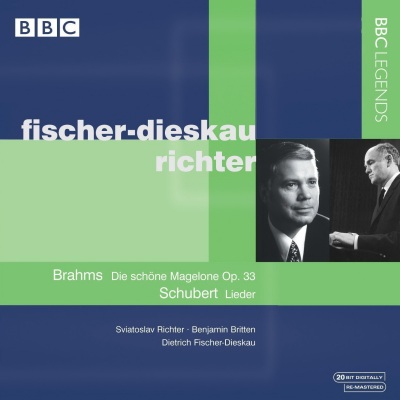
Brahms: Die schöne Magelone Op.33 / Schubert: Lieder
In his interesting note that accompanies this CD David Patmore tells us that it was Benjamin Britten who was instrumental in persuading Sviatoslav Richter and Dietrich Fischer-Dieskau to perform together on the concert platform. The Aldeburgh Festival performance of Die schöne Magelone that’s preserved here was their first recital together. So it’s appropriate therefore that the remainder of the disc should be given over to a selection of lieder by Schubert performed seven years later at the Festival by the great German baritone and Britten himself. The seven-strong Schubert group gives great pleasure. Fischer-Dieskau is in fine voice and in Britten he has a most perceptive partner. That much is evident right at the start of ‘Auf der Donau’ to which Britten provides a beautiful and naturally weighted introduction, to which the singer responds with sensitivity. The slower sections of this song are especially successful, not least in showing off Fischer-Dieskau’s rich legato line. Later in the group I admired the ease with which he sings in his upper register in ‘Der Wanderer’ and, indeed, the calm, lyrical reading of this song is a delight. By contrast, ‘Prometheus’ requires – and gets - strong projection from both artists. Britten produces sonorous piano tone to match the singer’s powerful delivery of the opening lines. Fischer-Dieskau is commanding in this song and always in control. However, when we reach ‘Der Wanderer an den Mond’ he fines down his voice admirably while Britten places the piano part with expert lightness of touch. They conclude this highly successful and well-contrasted group with a light and buoyant account of ‘Fischerweise’. Britten and Fischer-Dieskau were both famously demanding and discerning artists. So too was Richter and, to the best of my knowledge, he didn’t partner many singers in recital, though Peter Schreier’s name springs to mind. It’s interesting to learn from David Patmore that Richter found Fischer-Dieskau to be an exacting partner. However, these two serious and searching musicians combine to excellent effect in the fifteen songs that make up the five books of Die schöne Magelone. Both artists enter fully with Brahms into the high romantic world of the poet, Ludwig Tieck. The second song in Book One, ‘Traun! Bogen und Pfeil’ is delivered with ringing ardour by Fischer-Dieskau, who’s every bit the romantic man-at-arms. Immediately afterwards, in the lovely ‘Sind es Schmerzen, sind es Freuden’, the singer spins an enviable legato line to complement the lovely piano introduction. Another song that particularly caught my ear was the second song from Book Two, ‘Wie soll ich die Freude’. This is a wonderfully varied song, into which Brahms packs a lot in the span of just a few minutes. It’s a very fine composition and Fischer-Dieskau and Richter do it very well indeed. The third song in Book Three, ‘Ruhe, Süssliebchen, im Schatten’, is given a magically subdued and intense reading by both musicians. Fischer-Dieskau’s vocal control is superb throughout. The stormy ‘Verzweiflung’ (Book Four, No. 1) is powerfully projected, whereas ‘Geliebter, wo zaudert’ (Book Five, No 1) dances along lightly. The very last song in the collection, ‘Treue Liebe dauert lange’ is elevated and eloquent in the hands of these two fine interpreters. At the end, oddly, there’s no applause. As an audience was obviously present the applause must have been edited out but I can’t imagine that it was anything other than warm after such a splendid performance of these delightful songs. By the way, there is applause after the Schubert group. There is some audience noise in the Brahms in particular but, even when listening through headphones I never found it obtrusive. In both performances we find Fischer-Dieskau in marvellous voice. Time and again while listening to this disc I marvelled at the ease and lightness with which he produces his voice in its upper register. Equally, the lowest notes are produced with satisfyingly round, full tone. Yes, there are a few occasions where, in his desire to be expressive, he perhaps over-emphasises a word or a phrase. I have to say, though, that there were no such occasions that bothered me or that spoiled my enjoyment. The recorded sound is perfectly satisfactory, though in the Brahms I noticed some occasions when Fischer-Dieskau obviously moved a little while singing and his voice switched from one loudspeaker to the other but this doesn’t strike me as a problem. What is a problem is BBC Legends’ continuing practice of refusing to supply texts and translations in their booklets. It’s true that these are available on their website but if you download them and then print them off, as I did, without messing around with the font size and layout then the full set of twenty-two texts and translations occupies no less than twenty-eight pages of A4 paper. That’s completely unacceptable, especially for an important archive series such as this. However, notwithstanding the lack of easily accessible texts this is a rewarding and deeply satisfying issue. Here we find three master musicians at work and the results are uniformly excellent. This is a superb lieder disc; definitely one for the connoisseur. -- John Quinn, musicweb-international.com
